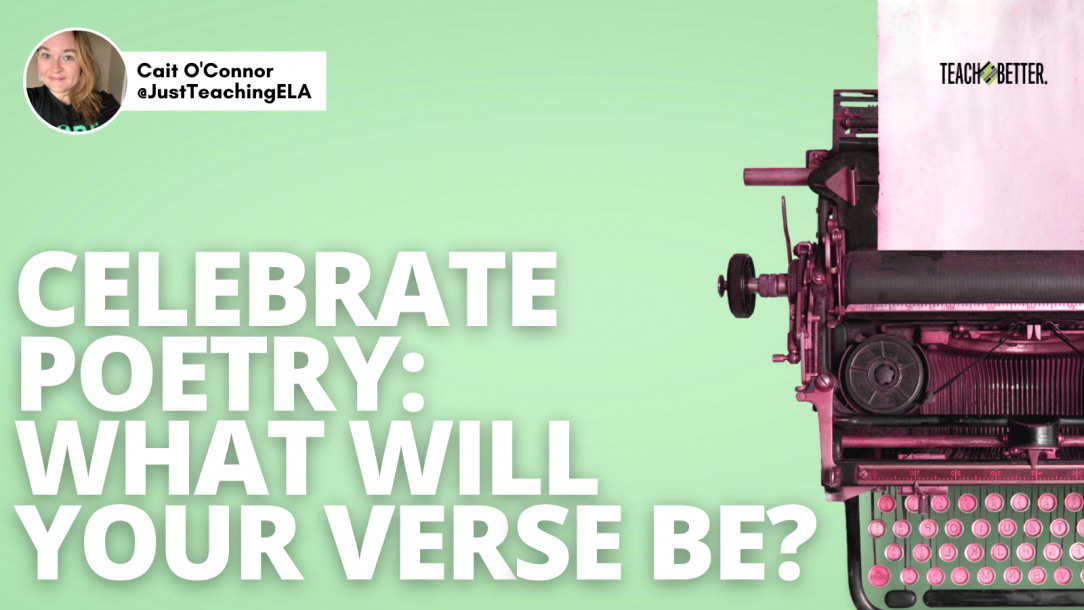TL;DR:
- Poetry offers students an access point into language.
- Spoken and written word have the power to foster conversation, liberation, and increase student voice.
- Poetry instruction that is multimodal (spoken word, video, and audio) increases engagement and can be a great way to delve into social justice topics in the classroom.
- It’s OK to just celebrate poetry without feeling intimidated by it!
Happy National Poetry Month!
There is so much to celebrate about poetry every month, but I will highlight some of my favorite poems and poets that I’ve leaned into this year and in past years.
First, I want to recognize and validate that reading poetry is more than an academic pursuit. Poetry is an act of art, an act of love, a relationship between emotion and language. I have always taught poetry to students under the premise that sometimes, poetry doesn’t have to mean anything laborious or deep. Sometimes, words just are. Sometimes, language just is. We can appreciate it, allow ourselves to hear it, and read it, and write it, and see it, and feel it.
At the beginning of our poetry unit this year, I played a scene from Dead Poets Society. It’s the scene where Robin Williams explains to his new students why studying poetry is important.
“We don’t study poetry because it’s cute,” he says. “We study poetry because we are members of the human race.”
I approach the teaching of poetry this way, too.
Students should feel like poetry is accessible to them, because it should always be accessible to them. They are participants in humanity and more often than not, listeners of music; so I begin there by asking them about their favorite songs, and finding strategies and elements in the songs they enjoy.
They are participants in humanity and more often than not, listeners of music; so I begin there by asking them about their favorite songs, and finding strategies and elements in the songs they enjoy. Share on XCelebrate Poetry: Poetic Choice
Poetry comes in many forms, and it’s so important to honor that for our students. I always teach a mix of song, text and spoken word when introducing students to poetry. This year, we started with Billy Collins’ “Introduction to Poetry” and Robert Frost’s “Nothing Gold Can Stay.” We also looked at the #TeachLivingPoets library, and discussed the differences in performance and strategy between written and spoken word pieces. My students loved poems like “Lost Voices” by Darius Simpson and Scout Bostley, “Totally Like Whatever, You Know?” by Taylor Mali, and “Afro-Latina” and “Rat Ode” by Elizabeth Acevedo. We even read Julia Alvarez’s “How Will This Pandemic Affect Poetry?” as a way of looking at the past year and the lessons it has taught us through poetic form.
Like many teachers, I also endeavored to teach breakout poet and Youth Poet Laureate Amanda Gorman’s poems. The real-time convergence of poetry and history enabled our investigation of other inaugural poems by Robert Frost, Maya Angelou, and Richard Blanco.
Celebrate Poetry: Poetic Justice
The discussion of the past month’s poetic developments extends to our nation at large. Is it enough to simply teach, offer and elevate poets and authors of color, in a nation where the humanity of their bodies is still debated and denied regularly?
Teachers, specifically white teachers, must be cautious not to tokenize or fetishize Amanda Gorman or her incredible work. There has been a circulation of monetized lesson plans developed within HOURS after her inaugural poem was delivered. It is not ethical or antiracist to take from and make money off of a BIPOC creator or their work.
Moreover, how can we celebrate while silencing and policing the words, language, bodies, and existence of Black and Brown girls in our own classrooms? Are we doing the work of white saviorism/supremacy, carcerality, nationalism, and other harmful ideologies that negate that representation? How can we abandon racist policies, practices, and frameworks and instead cultivate the poets sitting in the desks before us?
[scroll down to keep reading]
Celebrate Poetry: This Month, Every Month
Cultivating the poets in your own classroom comes with honoring culture, multilingualism, and identity above all else. See your students for who they are, how they talk, what they love, and what they experience. Every student’s language and life is worthy of a poem—not just the students in our AP classes or on our high honor rolls or with college-educated parents who read them Whitman in preschool.
The poems and poets we select for our students to witness have power. We can (and should) choose poems that challenge our students to think about the systems that do harm to BIPOC, immigrants, women, LGBTQIA+ people, and people with disabilities. Give them models that replicate their experiences or encourage them to consider the experiences of others, AND do something to change the conditions we all live in. This month and every month, elevate the words and work of all the poets, bards, and artists in your classroom. Ask all your students: What will your verse be?
About Cait O’Connor
Cait O’Connor is a fourth-year public school English/ESOL educator in New York, committed to social justice and equity in education and beyond.


